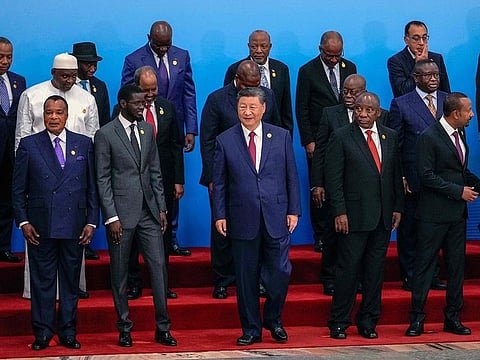China expands economic engagement with Africa
Beijing reinforces its partnership with Africa, highlighting ongoing cooperation

With much of the Western world consumed in military supplies to Ukraine and to Israel, it was China again that stole the spotlight in economic engagement with one of the most deprived regions — Africa. Its latest, Forum on China-Africa Co-operation (FOCAC) which opened in the first week of September — the first in person meeting post COVID was attended by at least two dozen heads of state or government.
The event was seen as a barometer of China’s state of relations with Africa.
The FOCAC is meant to demonstrate Beijing’s growing global presence despite rising discomfort in the US over China’s amassing clout especially among the ‘global south.’ This courtship is also a part of China’s geopolitical competition with the US, which has intensified in the recent years.
This tri-annual Forum therefore, remains the highlight of most African leaders’ diplomatic engagements calendar for nearly quarter of century since its inaugural meeting in 2000, according to the Economist.
Also Read: Will Oli’s return tip the scales in Nepal?
Africa’s big opportunity
Leading into the FOCAC there was much scepticism over the volume of China’s commitments. Much to the chagrin of detractors President Xi Jinping opened the Forum with pledges of $51 billion in financing for Africa for the next three years, which is substantially more than the last meeting held during COVID.
Xi also promised to exempt 33 least developed African states from import duties to “help turn China’s big market into Africa’s big opportunity”.
He pledged a billion yuan (approx $140 million plus) in grants for military assistance.
President Xi, striking a fraternal chord with Africa assured, “our history will not go back to the old days of colonialism and cold war confrontation. Africa should not become a wrestling ground for major countries.”
Premier Li reaffirmed China’s commitment to speed up negotiations and signing of framework agreements on economic partnership that would grant access to the Chinese market for African agricultural exports and “high-quality” goods.
The leaders released the 2025-2027 action plan pledging to “keep the global industrial and supply chains stable and smooth, oppose all forms of unilateralism, protectionism and maximum pressure, and oppose erecting walls and barriers, decoupling and supply disruption”. The Chinese have got Africa on their side against everything America is doing now to stifle China’s growth.
Analysts point out that China seems to be shifting emphasis away from funding large infrastructure projects and going for ‘small and beautiful’ projects. At the same time a closer study of the nature of Chinese assistance indicates that there is a diversification of the forms of the financial support. It is now more a mixture of grants, loans and investments both from the state and through the banks.
China’s latest pledges demonstrate that China remains engaged for a long haul as the largest provider of economic aid to Africa. The continent too understands China’s value as a partner in its growth after centuries of European exploitation.
China-Africa trade volume
Reciprocating to China’s assistance and for further commitments, Mohamed Ould Ghazouani, the president of Mauritania and chairman of the African Union, declared that China-Africa partnership is a leading model for South-South cooperation. The African continent he said was in dire need of China’s assistance in establishing security and stability, promoting growth and strengthening its voice in international forums”.
China strongly maintains its position as the largest trading partner of the continent. Surging demand for African minerals needed for transition to green energy the 2023 China-Africa trade volume reached record $282 billion.
Over the years Beijing has cultivated an image of a partner with the developing countries — and much of it is Africa. China bills such gatherings as a “grand reunion of the China-Africa big family.” China does not also carry any historic baggage of colonisation and its resultant excesses over the African continent.
The results of this filial outreach are evident in support China is able to draw in the international organisations and access to critical minerals necessary for renewable energy needs of the future.
China’s ability to sustain these triannual summits, attracting a significant portion of African leadership for over two decades, is a remarkable political accomplishment. The investments made now position China to reap benefits for generations to come.
With all its commitments to Africa and BRI, China hopes to send a message that Beijing offers a more robust alternative and has ample support outside the exclusive western dominated world.
Sajjad Ashraf served as an adjunct professor at the Lee Kuan Yew School of Public Policy at the National University of Singapore from 2009 to 2017. He was a member of Pakistan Foreign Service from 1973 to 2008 and served as an ambassador to several countries.


